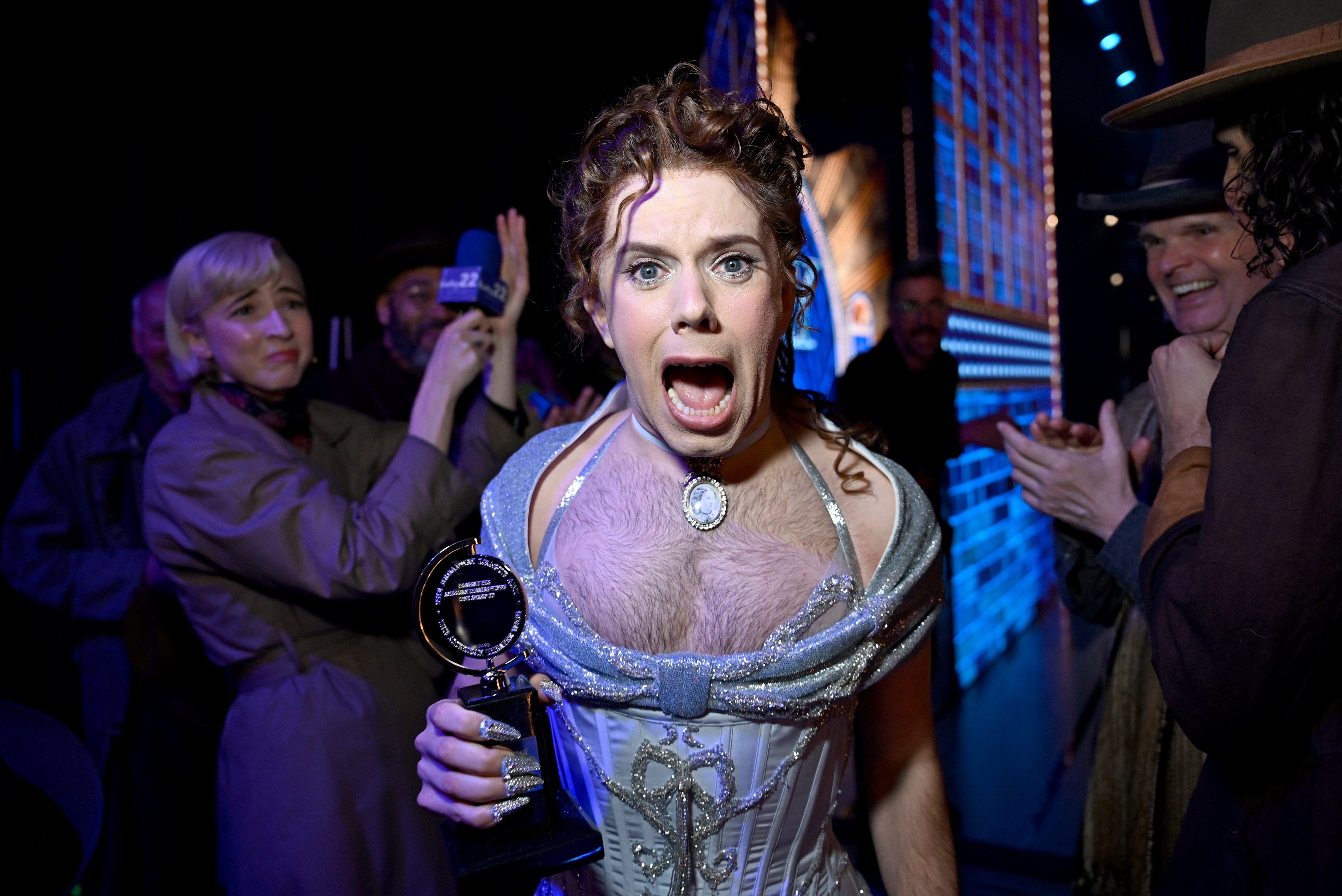
On Sunday night, and for the first time ever, the Tony Award for Best Performance by an Actor in a Leading Role in a Play was presented to an actor who is not a man. Cole Escola, the 38-year-old star of the hit Broadway comedy Oh, Mary!, took home the award, becoming the first non-binary performer to win in the category at the Tonys (long considered theatre’s equivalent of the Oscars).
While there’s reason to celebrate the win – as a breaking of boundaries and a spotlighting of LGBT+ talent – the night raised questions about the very sustainability of the Tony Awards format, which divides its performance categories by gender. It’s a practice that’s more or less ubiquitous: nearly all the major film award bodies do it, including the Oscars, as well as the TV ones, such as the Emmys. But it’s one that seems increasingly incompatible with our modern understanding of gender. It was glaring to see Escola, wearing a dress and long auburn wig (an homage to Broadway legend Bernadette Peters) – in other words, presenting themself as very visibly not a cisgender man – win in a category otherwise populated by men (among them George Clooney and Daniel Dae Kim). But these are the options, if you’re a non-binary actor in show business: compete in a gender field to which you don’t belong, or don’t compete at all.
It’s perhaps doubly dissonant given that Escola won the award for playing a woman: in the irreverent Oh, Mary! they portrayed Mary Todd Lincoln in the days leading up to Honest Abe’s assassination. (The role has elsewhere been played by Betty Gilpin, a cis woman, and Tituss Burgess, a cis man.) In recent years, many non-binary actors have often elected to run for awards in the male or female categories: Bella Ramsey, for instance, competed for best actress in various TV awards for their work in The Last of Us, likewise House of the Dragon’s Emma D’Arcy. But others have opted out: Liv Hewson, who stars in the hit drama Yellowjackets, chose not to submit themself for the Emmys, stating: “It’s quite straightforward and not that loaded. I can’t submit myself for this because there’s no space for me.”
Often, when it comes to issues of gender, the phrase “it’s complicated” is used to excuse regressive policy decisions. But in this case, it is complicated, if only because of the wider structures of bigotry that pervade the entertainment industry. The fear is that, if the Tonys, or the Oscars, were to combine the acting categories into genderless lead and supporting actor brackets, then it would ultimately end up limiting opportunities for women. “It’s so important that the recognition for women in this industry is preserved,” Ramsey has said. “I think the ‘gendered categories’ conversation is a really interesting one and I don’t have the answer.”
This fear played out shortly after the Brit Awards removed gendered categories – a decision partly prompted by non-binary singer Sam Smith refusing to submit themselves into the male or female categories in 2021. In 2023, there controversially wasn’t a single woman nominated for Artist of the Year. (The next two years, however, fared markedly better.) If there is to be a shift towards uniformly ungendered awards, it must be accompanied by a conscious and continuous evolution of the voting process. There will always be women out there just as worthy of awards as men; the question is whether those in positions of influence have the mandate to identify and champion them.
There are probably other reasons why those in the entertainment industry might be opposed to desegregating the acting awards. For performers, it theoretically halves your chance of winning in any given year – something studios and agents would surely baulk at, too. Ultimately, the whole issue bumps up against one of the central problems of awards ceremonies – that they are, on a very fundamental level, a capitalist construct. Awards have nothing to do with art; the Oscars were created in an attempt to quell emergent Hollywood unions. And so while the acting world might indeed encompass some of the most progressive and diverse parts of society, awards bodies are never going to truly reflect or affirm this.

It’s worth noting that some awards bodies have done away with gendered categories very successfully. The Gotham Awards and the Independent Spirit Awards, for example – two of the most highly regarded film awards bodies – have both ditched the male and female brackets, and have had no trouble finding worthy female nominees to recognise. Theirs is an example that needs to be followed. It’s great that Escola was able to find recognition in a system that’s designed to ignore people like them. But it’s still a system that needs changing – whether it’s complicated or not.







